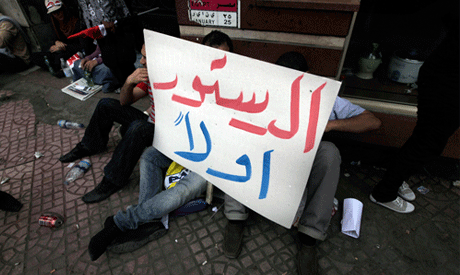 Egypt's ruling military has inserted a new element of confusion even as Egypt tries to sort out turmoil surrounding its upcoming presidential elections. The generals now insist a new constitution be written before a new president is seated, a rushed timeframe that some fear may prolong their hold on power.
Egypt's ruling military has inserted a new element of confusion even as Egypt tries to sort out turmoil surrounding its upcoming presidential elections. The generals now insist a new constitution be written before a new president is seated, a rushed timeframe that some fear may prolong their hold on power.
Egypt's military takes bigger role in constitution
By-Ahram
Home News
00:04
Wednesday ,18 April 2012

For weeks, the Muslim Brotherhood and other Islamists sought to dominate the writing of the country's first new constitution since the fall of President Hosni Mubarak more than a year ago. But after Islamist domination of the process sparked a backlash of criticism, the military has stepped back in to take a more direct role.
The military's new assertiveness has split the national debate. Some liberals have welcomed the military's weight to counteract the increasing power of Islamists. Others, however, worry that the generals aim to continue their control over Egypt beyond their promised deadline for handing over power to a civilian president by the end of June.
In a meeting Sunday, the ruling Supreme Council of the Armed Forces urged heads of political parties, including the Brotherhood, to finish writing the country's constitution before the election of a new president, now set for 23-24 May.
The generals did not directly say the election would be delayed if the constitution is not finished, according to Mustafa El-Naggar, who attended the meeting. But few believe the document can be written and approved by a referendum in that timeframe.
"My feeling is something is just not right," said Muslim Brotherhood spokesman Mahmoud Ghozlan. "This is too foggy ... Is there a desire to find a pretext to extend the transitional period?"
El-Naggar's Al-Adl Party warned that pushing back elections would open the door for "mayhem that threatens the country's security ... It is a coup against the democratic transition. The people won't accept anyone ruling them without an election."
The election has already been marred by confusion after the commission overseeing the process on Friday disqualified 10 of the 23 would-candidates from the race, including the top three hopefuls. The three — the Muslim Brotherhood's Khairat el-Shater, former intelligence chief Omar Suleiman, and ultraconservative Islamist Hazem Salah Abu-Ismail — all submitted their appeals on Monday.
The election commission is expected to decide Tuesday which appeals will be reviewed, and a final list of candidates will be released 26 April, just under a month before the vote.
The process for writing the constitution has similarly been thrown into turmoil, fueling doubts it can be finished quickly. A panel created by parliament is supposed to draw up the document. Last month, the Brotherhood and other Islamists, who hold 70 per cent of parliament's seats, formed a 100-member panel dominated by Islamists, provoking an outcry that they were trying to control the process.
A court suspended that panel, and now the military is mediating a new attempt to form a new one. The parliament must still vote on the final makeup.
Khalil El-Anani, an expert on Islamist groups, said the Brotherhood — buoyed by its victories in parliamentary elections late last year — overreached in grabbing power, fanning fear from many among many Egyptians, and opened the door for the military to step in.
"The Brotherhood made a huge miscalculation and now is dealing with a grave loss in the last round of its struggle with the military council," for power, he said.
Many of the liberal parties "don't have a problem with the supervision of the military so long as they rein in the Islamists," said El-Anani. He said that by suggesting that a constitution must be written first the generals "created more uncertainty and more division."
At stake in the constitutional debate are the powers and privileges the president and the military will retain in the new Egypt. The military aims to enshrine in the constitution its special say in the country's political life and protection of its widespread business interests.
Last year, it tried to push guidelines for the constitution writing that would preserve its status, including an exemption from civilian oversight of its budget. At the time, back in November, the Muslim Brotherhood, backed by a number of revolutionary forces, challenged the military's document with large rallies, forcing it to withdraw the suggestions.
But times are different now. Many liberals now fear the Brotherhood more than the military, after the group won nearly 50 percent of parliament, sought to dominate the constitutional process and decided to run a candidate for the presidency, fueling a perception that they are hungry for power.
As a result, some liberal parties have said the military should now guide the constitution writing process.
Reform leader Mohamed ElBaradei, who pulled out from the presidential race saying it lacked transparency, said a constitution can't be written in one month. ElBaradei, who has been a proponent of a longer transition that starts with writing the constitution, wrote on his Twitter account that "the travesty" of "bungled" transition continues.
"Now the military council wants the revolution's constitution written in one month. Don't belittle the importance of the constitution. Egypt deserves better than this."
But some among the revolutionary youth groups that led the uprising last year against Mubarak oppose letting the military run the process.
Ahmed Imam, a member of the National Front for Justice and Democracy, said Islamist and secular groups must unite against the military to ensure the revolution's goals of overhauling the country's authoritarian rule.
"If the Brotherhood don't side with the revolution and clearly, they will exterminated and then we will be after them," he said.


